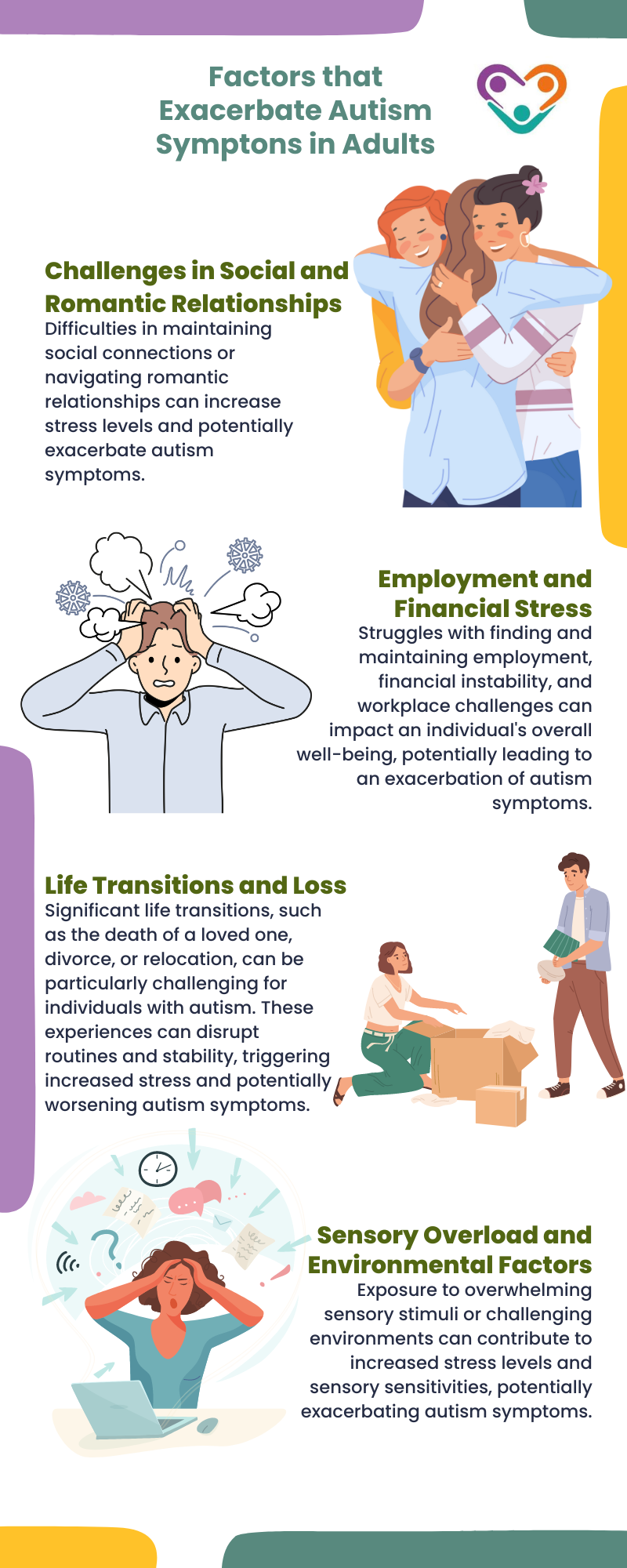Autism Spectrum Disorder (ASD) is a complex, lifelong condition that affects how people communicate, interact, and process information. While early intervention and therapies can help manage symptoms, many wonder if autism can worsen with age.
Understanding the progression of autism is crucial for caregivers, educators, and individuals on the spectrum. In this article, we’ll explore how autism might change over time. By examining recent research and expert insights, we aim to provide a clearer picture of what to expect as individuals with autism grow older and how to support them effectively.

Age and Autism Symptoms
To understand the potential changes in autism symptoms with age, it is important to consider the factors that can influence autism problem behaviors. Let’s first start with age and autism symptoms.
Autism is typically diagnosed in early childhood, but symptoms can change over time depending on various factors. It is important to note that there is no definitive path that autism symptoms take over time, as each individual’s experience is unique.
However, it is common for certain symptoms to become more pronounced and problematic as the child grows older and faces increased social challenges and mood changes during adolescence.
As individuals with autism age, they may experience changes in their social interactions, communication abilities, and repetitive behaviors. Some individuals may develop new coping skills and acquire strategies to navigate social situations, while others may struggle with these areas.
It is important to provide ongoing support and intervention to help individuals with autism navigate these changes and continue to develop their skills.

Social Challenges and Mood Changes
Social challenges are a common aspect of autism and can significantly impact an individual’s daily life. These challenges can range from difficulty understanding social cues and norms to struggles with forming and maintaining relationships.
As individuals with autism age, they may face increasing social demands and expectations, which can lead to heightened anxiety and frustration.
Mood changes are also common in individuals with autism, and these changes can further influence problem behaviors. Adolescence, in particular, is a period of significant hormonal and emotional changes. For individuals with autism, these changes can compound the challenges they already face, potentially leading to increased meltdowns, anxiety, and irritability.
It is important to recognize that while autism symptoms may change and certain behaviors may become more pronounced with age, this does not necessarily mean that autism itself worsens neurologically.
Rather, the challenges associated with social interactions, communication, and emotional regulation may become more apparent as individuals navigate the complexities of adulthood.

Changes in Autism Symptoms with Age
Autism is a neurodevelopmental disorder that tends to manifest at an early age. While there is no definitive path that autism symptoms take over time, it is important to understand how symptoms may change as individuals with autism grow older.
In this section, we will explore the symptoms of autism in childhood, adolescence, and adulthood.
Childhood
In childhood, the symptoms of autism typically become more apparent. Common signs of autism in children include challenges with social communication and interaction, repetitive behaviors, restricted interests, and sensory sensitivities. It’s also at this point when autistic kids might be diagnosed with oppositional defiant disorder.
These symptoms often emerge in the first few years of life, with many children receiving a formal diagnosis by the age of 2 or 3.
During childhood, early intervention and therapy play a crucial role in helping children with autism develop important skills and coping mechanisms. With appropriate support and interventions, many children with autism can make significant progress and improve their ability to navigate social interactions and communication.
Adolescence
As individuals with autism transition into adolescence, they may face increased social challenges and mood changes. The social difficulties that are characteristic of autism can become more pronounced during this period, as teenagers navigate complex social dynamics and peer relationships.
Adolescence is also a time of hormonal changes and emotional development, which can impact the emotional well-being of individuals with autism.
While autism itself doesn’t necessarily worsen with age, certain symptoms can become more problematic during adolescence. Increased self-awareness and a desire for independence can lead to frustration and anxiety for individuals with autism, particularly when faced with social expectations and the complexities of teenage life.
Adulthood
In adulthood, individuals with autism may continue to experience challenges related to social communication, flexibility, and sensory sensitivities. However, it is important to note that the impact of autism can vary widely among adults.
While some adults may experience significant difficulties in daily life, others may develop coping strategies that enable them to navigate social situations and manage their symptoms effectively.
Common life experiences, such as facing the death of a loved one, failed romantic relationships, or employment problems, can exacerbate autism symptoms in adults. In these cases, autism symptoms can worsen with age, but not necessarily due to the disorder neurologically worsening.
Rates of depression and anxiety are also significantly high among older adults diagnosed with autism, which can impact their overall well-being and cognitive functioning.

Impact of Life Experiences on Autism Symptoms
Living with autism can be influenced by various life experiences that individuals with autism encounter. These experiences can either exacerbate autism symptoms or provide opportunities for effective coping strategies and management.
Understanding the impact of life experiences is crucial in providing support and enhancing the well-being of individuals with autism.
Exacerbating Factors
Certain life experiences can contribute to the exacerbation of autism symptoms in adults. While it is important to note that autism symptoms do not necessarily worsen neurologically with age, external factors can influence the manifestation and severity of these symptoms.
Some of the most common exacerbating factors include:

Understanding these exacerbating factors allows caregivers and individuals with autism to identify potential triggers and develop strategies to address and minimize their impact.
Coping Strategies and Management
Developing effective coping strategies and management techniques can help individuals with autism navigate the challenges associated with their condition. While each person with autism is unique, the following strategies may be beneficial:
- Establishing Predictable Routines – Creating and maintaining consistent daily routines can provide individuals with autism a sense of stability and predictability, reducing anxiety and promoting overall well-being.
- Implementing Sensory Regulation Techniques – Identifying sensory triggers and implementing sensory regulation techniques, such as using noise-canceling headphones or weighted blankets, can help individuals with autism manage sensory sensitivities and reduce stress.
- Social Skills Training and Therapy – Participating in social skills training and therapy can help individuals with autism develop effective communication strategies, improve social interactions, and enhance overall quality of life.
- Stress Management Techniques – Encouraging the use of stress management techniques, such as deep breathing exercises, mindfulness practices, or engaging in hobbies and interests, can provide individuals with autism tools to manage and reduce stress.
- Seeking Professional Support – Consulting with healthcare professionals, therapists, and support groups specialized in autism can provide valuable guidance and support for individuals with autism and their caregivers.
By implementing these coping strategies and management techniques, individuals with autism can develop skills to navigate the challenges they may face and improve their overall well-being.
It is important to note that the impact of life experiences on autism symptoms can vary from person to person. Each individual’s journey is unique, and personalized strategies should be developed in collaboration with healthcare professionals and based on the specific needs and strengths of the individual with autism.
Research continues to shed light on the neurological basis of sensory issues in autism, offering hope for more targeted and effective therapies in the future. By recognizing and addressing sensory processing difficulties, we can improve the quality of life for individuals with autism and their families. If you’re seeking specialized ABA therapy in New Jersey, Indiana, Georgia, and New York, Golden Care offers comprehensive services tailored to meet the unique needs of each individual. Contact us to learn more or book a consultation today.
Sources:
https://www.drakeinstitute.com/does-autism-get-worse-with-age
https://www.thetransmitter.org/spectrum/autism-features-may-be-more-severe-in-old-age
https://www.thetransmitter.org/spectrum/long-term-studies-track-how-autism-changes-with-age



